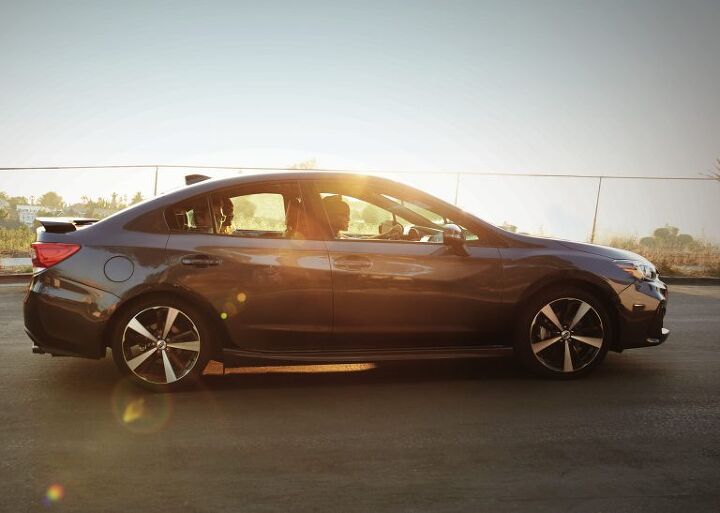Subaru Says Sedans Are Still Working, Doubles As Contingency Plan

Ford’s announcement that it will eventually eliminate every sedan from its domestic lineup has forced the automotive media to consider which automaker will be next to cart theirs off to the guillotine. Due to the growing popularity of crossovers and their inherent profitability, it’s probably just a matter of time until another manufacturer tosses all of its sedans in a burlap sack and drowns them in the proverbial river.
General Motors seems ready to abandon the Chevrolet Impala and Sonic, and Cadillac’s ATS, CTS, and XTS will soon be replaced by two unnamed sedans. Buick’s Lacrosse also looks to be a likely candidate for execution, and rumors exist that Caddy’s CT6 may also be destined for death. However, while rumors swell that American automakers are just years away from from killing the four-door car, Subaru says sedans remain totally relevant.
As a smaller but rapidly growing manufacturer (domestic sales have tripled since 2010), it’s dangerous for the brand to become too reliant on a single segment. If the market suddenly shifts, Subaru knows it’s better not to get caught with its pants down. In fact, it’s almost as if the company’s national manager of product communications, Dominick Infante, is counting on that.
“Gas prices are starting to come up now,” he told Motor Trend in a recent interview. “So a good hedge for better economy is having a sedan.”
That’s not to suggest Subaru hasn’t tried to alter its lineup to cash in on the current market trends. Its Forester and Outback have become more SUV-like with every generation. The Crosstrek, which was introduced in 2012, quickly matched the Impreza in terms of sales and currently exists as the brand’s best-selling model in North America. Subaru is also launching the three-row Ascent this year to compete with the rest of the world’s midsize crossovers.
Meanwhile, the company’s car sales have declined. In the first four months of 2018, sales of the Impreza fell 16.3 percent and the Legacy dropped 13.9 percent. WRX and STI sales have also declined a bit. Still, it’s not as dire as it sounds. The revamped Impreza actually saw a significant increase in sales last year, and looks to be on schedule to surpass every other year that wasn’t 2017.
“So we still make the Impreza and the Impreza hatchback,” Infante said. “They do get better gas mileage than, say, a comparable CUV like the Crosstrek, so we do sell those so if the market does change that’ll help sales of sedans.”
Subaru says entry level cars like the Impreza are also important in getting people set up with their first car, while sporting models like the BRZ or WRX help to attract younger buyers cut from a different cloth. However, it intends to keep both via its enviable level of brand loyalty and fill any gaps with new models like the Ascent.
“[Customers] stay with the brand except for this one area, when they have children starting to become 8 years old or so,” explained Infante. “[That’s] when they tend to say, ‘OK, my Outback or Forester is too small’ and they want to transport other kids [and] families, so then they leave the brand and they would go to our competitors. So they could buy a Honda Pilot or a Highlander and then come back when their kids are out of high school and buy an Outback.
“It’s kind of funny, they would come back or they would have their second car which would stay being a Subaru but we would lose them in that one area … Basically it’s an open door where the customers are just walking out. Now we’ve got something to fill that in and keep them in a Subaru.”
[Images: Subaru]

A staunch consumer advocate tracking industry trends and regulation. Before joining TTAC, Matt spent a decade working for marketing and research firms based in NYC. Clients included several of the world’s largest automakers, global tire brands, and aftermarket part suppliers. Dissatisfied with the corporate world and resentful of having to wear suits everyday, he pivoted to writing about cars. Since then, that man has become an ardent supporter of the right-to-repair movement, been interviewed on the auto industry by national radio broadcasts, driven more rental cars than anyone ever should, participated in amateur rallying events, and received the requisite minimum training as sanctioned by the SCCA. Handy with a wrench, Matt grew up surrounded by Detroit auto workers and managed to get a pizza delivery job before he was legally eligible. He later found himself driving box trucks through Manhattan, guaranteeing future sympathy for actual truckers. He continues to conduct research pertaining to the automotive sector as an independent contractor and has since moved back to his native Michigan, closer to where the cars are born. A contrarian, Matt claims to prefer understeer — stating that front and all-wheel drive vehicles cater best to his driving style.
More by Matt Posky
Latest Car Reviews
Read moreLatest Product Reviews
Read moreRecent Comments
- Honda1 Unions were needed back in the early days, not needed know. There are plenty of rules and regulations and government agencies that keep companies in line. It's just a money grad and nothing more. Fain is a punk!
- 1995 SC If the necessary number of employees vote to unionize then yes, they should be unionized. That's how it works.
- Sobhuza Trooper That Dave Thomas fella sounds like the kind of twit who is oh-so-quick to tell us how easy and fun the bus is for any and all of your personal transportation needs. The time to get to and from the bus stop is never a concern. The time waiting for the bus is never a concern. The time waiting for a connection (if there is one) is never a concern. The weather is never a concern. Whatever you might be carrying or intend to purchase is never a concern. Nope, Boo Cars! Yeah Buses! Buses rule!Needless to say, these twits don't actual take the damn bus.
- MaintenanceCosts Nobody here seems to acknowledge that there are multiple use cases for cars.Some people spend all their time driving all over the country and need every mile and minute of time savings. ICE cars are better for them right now.Some people only drive locally and fly when they travel. For them, there's probably a range number that works, and they don't really need more. For the uses for which we use our EV, that would be around 150 miles. The other thing about a low range requirement is it can make 120V charging viable. If you don't drive more than an average of about 40 miles/day, you can probably get enough electrons through a wall outlet. We spent over two years charging our Bolt only through 120V, while our house was getting rebuilt, and never had an issue.Those are extremes. There are all sorts of use cases in between, which probably represent the majority of drivers. For some users, what's needed is more range. But I think for most users, what's needed is better charging. Retrofit apartment garages like Tim's with 240V outlets at every spot. Install more L3 chargers in supermarket parking lots and alongside gas stations. Make chargers that work like Tesla Superchargers as ubiquitous as gas stations, and EV charging will not be an issue for most users.
- MaintenanceCosts I don't have an opinion on whether any one plant unionizing is the right answer, but the employees sure need to have the right to organize. Unions or the credible threat of unionization are the only thing, history has proven, that can keep employers honest. Without it, we've seen over and over, the employers have complete power over the workers and feel free to exploit the workers however they see fit. (And don't tell me "oh, the workers can just leave" - in an oligopolistic industry, working conditions quickly converge, and there's not another employer right around the corner.)

































Comments
Join the conversation
And oh yeah, show me a sedan a 6 footer can sit upright in in the back seat. We had a Legacy as a rental this week and my head brushed the headliner though legroom was OK. Build sedans that aren't glorified coupes and maybe some people will buy. Nobody wants to bang their head every time they load baby in the car seat and then try to get the stroller in that mail slot of a trunk opening. Sedans have just evolved into something that aren't practical for many people. Blame CAFE maybe, but by in large, as family cars they are seriously compromised. Enter the Crossover
Geez you make two sedan platform variations which comprise a handful of models, its not controversial.